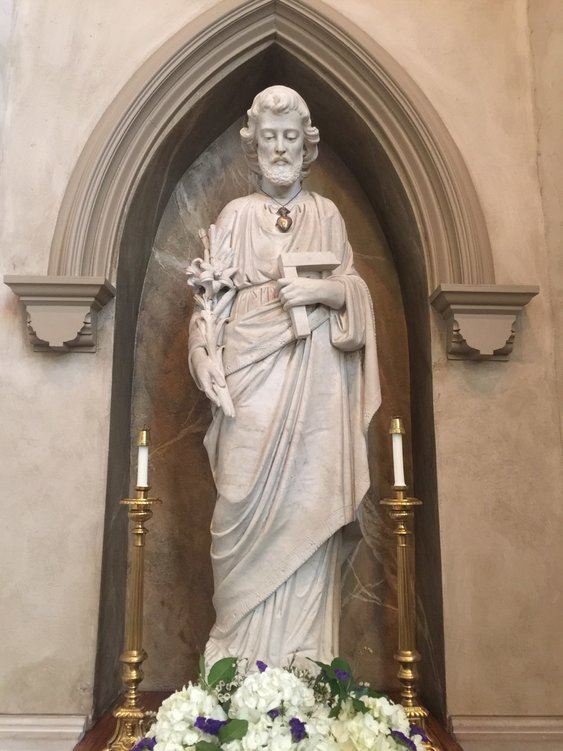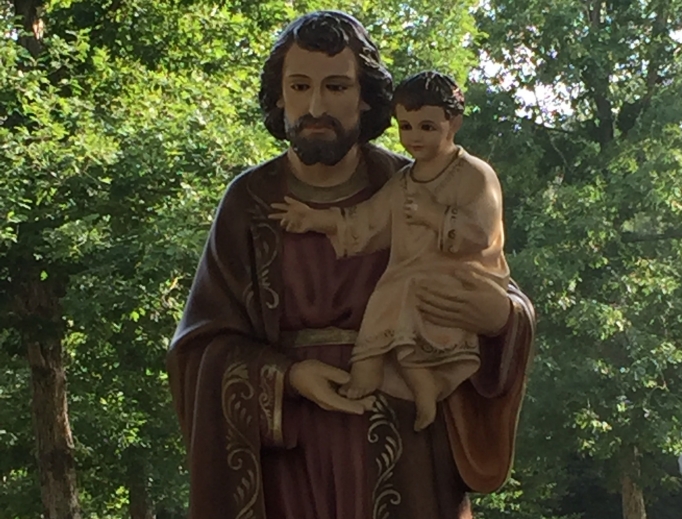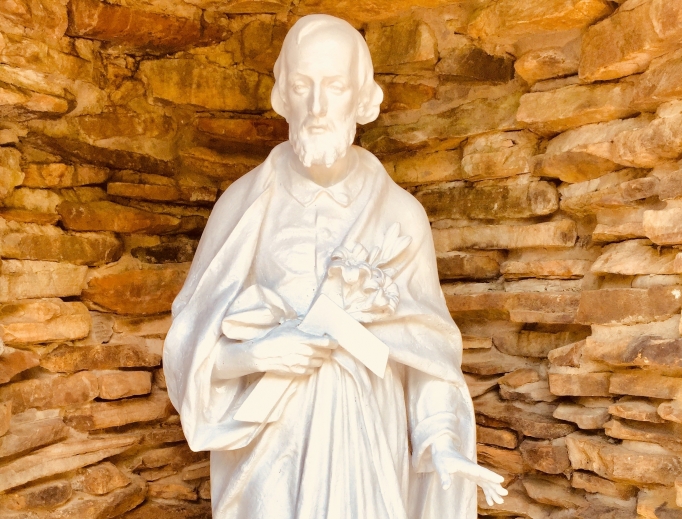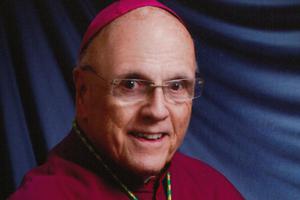Birmingham Diocese Celebrates ‘Year of St. Joseph’
Patron of the universal Church honored in yearlong devotions.

BIRMINGHAM, Ala. — The Diocese of Birmingham, Alabama, is looking to St. Joseph. Bishop Robert Baker has proclaimed a “Year of St. Joseph” that began May 16. It is possibly the only “Year of St. Joseph” ever done in the U.S. dioceses, or elsewhere.
“This Year of St. Joseph will be a grace-filled time for us to reflect upon who he is and how he helps us now — not only by his holy example, but also by his powerful prayer and protection,” Bishop Baker explained in a pastoral letter instituting the celebration.
The Year of St. Joseph immediately followed the close of the diocesan “Marian Year” that began May 13, 2017, Fatima’s 100th anniversary, and ended this May 13. With a year leading up to the Eucharistic Congress planned for the 50th anniversary of the Diocese of Birmingham June 28-29, 2019, Bishop Baker thought, “Why not usher that in with a Year of St. Joseph?”

The idea “caught on,” he told the Register.
In his “Year of St. Joseph Pastoral Letter,” Bishop Baker announced it was his “great joy” to proclaim this year providentially beginning May 16, 2018, to May 1, 2019, the feast of St. Joseph the Worker.
Devotions Prompting This Year
Blessed Pius IX proclaimed St. Joseph “patron of the universal Church” Dec. 8, 1870, a reference not lost during Birmingham’s special year.
Several factors prompted this year in honor of St. Joseph. The choice has deep roots in Bishop Baker’s own life.
“My middle name is Joseph,” he said, “and I always had a devotion to him.” He continuously prays a novena to St. Joseph and has promoted this and other prayers to St. Joseph through Prayers to Our Lady of Joyful Hope and St. Joseph that he has had printed. The prayer books will be available from the diocese's main office for a freewill donation to the diocese.
The husband of Mary and earthly father of Jesus has another strong connection to the diocese. Bishop Baker arrived in Birmingham in 2007, hoping to establish a Comunità Cenacolo, of which he is co-founder, in his new diocese. The mission is to help those with addictions recover in a Christian setting.
“We saw so many signs happen in relation to St. Joseph,” the bishop explained. “It’s not easy to get started up, but around the feast of St. Joseph, everything started falling together. We really believe he was instrumental in helping us bring the Comunità Cenacolo to Alabama.”
Again, providentially, the process began on a March 19, the feast of St. Joseph, when Bishop Baker and the community learned of an available property, immediately requesting the intercession of St. Joseph regarding its feasibility.


Practically in sight of the Shrine of the Most Blessed Sacrament in Hanceville, the property was ideal. Bishop Baker noted the private roadway leading to it is St. Joseph Lane. At its entrance stands a statue of St. Joseph he brought from Ohio.
“The Cenacolo community has great devotion to him,” he added. Daily, members pray: “Thank you, St. Joseph, and provide for us.”
The Eucharistic Congress for the diocese’s 50th anniversary also prompted the Year of St. Joseph. Bishop Baker explained, “We felt that our diocese needed special prayers to go to St. Joseph for the planning that will still be going on.”
Focus for the Year
For this year, several focal points converge to increase the faithful’s devotion to St. Joseph and to seek his intercession.
One essential area concerns training in missionary discipleship — what it means to be a missionary and disciple as a Christian. Bishop Baker said, “In this Year of St. Joseph, we are working on those elements. St. Joseph will help us.”
David Anders, host of EWTN Radio’s Called to Communion and a parishioner of the Birmingham Diocese, finds that with this pastoral priority of missionary discipleship, “it seems fitting we seek to imitate in a special way that quiet contemplative service that St. Joseph exemplified. We have to have a contemplative dimension at the heart of the faith.” With no spoken words of Joseph recorded in Scripture, he added, “Joseph is the great contemplative.”
Also, in his pastoral letter, Bishop Baker addresses the “four marks of the Church” in relation to St. Joseph, highlighting in “this special year of grace for our diocese” that the diocese is invoking St. Joseph to constantly pray that the Church’s “members grow in unity, in holiness, in catholicity and in apostolicity.”
He related these four marks, professed in the Nicene Creed, to St. Joseph and how the faithful can respond.
For instance, since everyone is called to holiness, Joseph is the perfect example of “a heroic level.” He did “ordinary things that all men — and husbands and fathers — must do: work to make a living, care for a family, build them up in the good, and defend them from all harm. This means that Joseph attained great sanctity not by doing extraordinary acts, but by doing ordinary actions very well — with the help of God’s grace and in accord with his will.”
Bishop Baker hopes everyone will “ask St. Joseph to inspire us to trod boldly down the path of holiness by living each day in God’s presence and striving to do all things, however ordinary or even tedious they may be, well and with love,” and “ask him also for the grace to value silence in our daily lives, so that we may hear God speaking to us.”
As for apostolicity, “St. Joseph shows us in the Gospels what it means to step out in faith, to respond to God’s call with confidence. We ask him to intercede for us, so that we may more confidently and boldly live out our Catholic faith and so lead more people to the unity, holiness and catholicity of Christ’s Church. We ask him to help us to be true missionary disciples.”
Father Joseph Wolfe of the Franciscan Missionaries of the Eternal Word, located in the Birmingham Diocese, sees this Year of St. Joseph as significant. He said St. John Paul II always saw St. Joseph’s fatherhood as a model of his own fatherhood.
Looking at societal problems, Father Wolfe pointed out that, in modern life, “pretty much across the board, the thing most missing is the role of the father. Troubled children didn’t have the guidance and direction of a good father in their lives.” That’s why it’s “so important holding up St. Joseph as a model of fatherhood.”
St. Joseph “was truly a father. He was there for the family, protecting the family from a king who wanted his son’s death.”
All men aren’t called to be physical fathers, but all are called to be fathers in some way, Father Wolfe said. “It’s a great blessing to hold up St. Joseph to remind us men how we are to live out our fatherhood and masculinity.”
“St. Joseph teaches us to be protectors of women,” he added.
Holy See’s Generous Response
Father Bryan Jerabek, rector of the Cathedral of St. Paul in Birmingham, who is assisting the bishop in implementing this special year, said that at Bishop Baker’s request, Pope Francis granted the diocese a special plenary indulgence.
The faithful need to visit one of the shrines, churches, chapels or sites in the diocese designated by Bishop Baker (several are already designated, including EWTN’s Our Lady of the Angels Chapel in Irondale) and there spend suitable time in prayer before the statue or image of St. Joseph; pray an Our Father and an approved creed (Apostles’ Creed or Nicene Creed); and pray also “an invocation to the Holy Family (for example: ‘Jesus, Mary and Joseph, bless my family’).” In addition, pray for the Holy Father’s intention, be detached from all sin, even venial, receive Holy Communion in the state of grace within at least 20 days before or after, and go to confession within the same 20-day parameter.
Father Jerabek is pleased with this year’s designation, in order “to encourage people to have a healthy devotion to St. Joseph.”
Bishop Baker, he added, “always had a great devotion to St. Joseph and he sees this as a fitting way to conclude his time as bishop for us and encourage people as well to have a healthy devotion to St. Joseph.” Next year Bishop Baker will turn 75, the customary age of retirement.
Concluding Vision
Anders is excited about the plenary indulgence for this year, due to his ongoing devotion to St. Joseph. He prays frequently, “Jesus, Mary, Joseph, I give you my heart and soul” with his family. Anders has found, “Our devotion to Christ has been deepened, elaborated, enhanced.”
Bishop Baker also requests prayers to St. Joseph for the diocese’s young men to respond with courage and generosity to the Lord’s call to priesthood and women to religious life, such as the prayer to “St. Joseph for Vocations” being recited at all Masses in the cathedral during this year.
Father Wolfe suggests another favorite prayer, the Litany of St. Joseph. He also recommended that during this year people “have a special altar or statue of St. Joseph somewhere in a prominent place in their home.”
In his pastoral letter, Bishop Baker concluded by seeking Joseph’s aid: “We call upon him during this special year as our patron and protector, so that we may indeed grow in our own Christian maturity” and “hope to become what we are called to be as members of Christ’s one, holy, catholic and apostolic Church.”
Joseph Pronechen is a Register staff writer.
- Keywords:
- diocese of birmingham
- joseph pronechen
- st. joseph















